Greens MP to introduce bill to lower voting age to 16
The Greens member for Brisbane (and chief agitator of the MPs for Ties coalition) Stephen Bates will introduce a bill into parliament today to lower Australia’s voting age to 16.
It is one of the issues Bates has really seized upon since his election, and an issue the Greens have been pushing for at large for some time.
The rationale is that young people are going to be affected the most by everything that is going on, so they should have a say on who represents them in the parliament.
Bates says:
16 and 17-year-olds are facing a lifetime without affordable or accessible housing, healthcare and education, and they will experience the worst consequences of government inaction on the climate crisis.
Young people have proven that they are engaged by taking to the streets in protest in unprecedented numbers. Right now, they have no other option to make their voices heard.
… Studies and examples from around the world show that lowering the voting age to 16 has improved civic engagement, providing young people with a lifelong drive to participate in democracy.
It’s their future at stake, and they deserve the right to hold their government accountable.
Tabitha Stephenson-Jones, a co-founder of the Make It 16 Australia campaign, was part of Bates’ statement and said:
Young people already know what we want from our leaders, and we know that we can’t help make decisions for our future without being in the room, let alone at the table.
Young people are engaged, enthusiastic and ready to make a difference, the only issue is – politicians are afraid. They’re afraid that once young people get the opportunity to vote, they will actually have to consider us in the choices they make for our communities.
Young people can be the voice for the future, but only if we are invited to the table, and given the opportunity to do so.
When this was an issue of conversation last year, Labor did not rule it out immediately, so you never know.
Key events
Filters BETA

Peter Hannam
You know summer is really over when the RBA board turns up for its first meeting of the year, on the first Tuesday of February, ie tomorrow.
(Staffers must have a shrine for the wily wonk who made sure January 1992 was the last time members had to disturb their beach or skiing holidays to turn up for the first month of the year. Even the GFC didn’t disturb their break.)
Your correspondent has been very much off the grid for the past week or so (a shrine of eternal thanks burns for those who stopped the damning of Tassie’s Franklin River four score years ago), and it’s a little surprising to see how little has changed when it comes to interest rate expectations.
Just as I left it, investors very much expect a 25 basis point increase in the RBA’s cash rate to 3.35% tomorrow. (Then it was a two-in-three chance, now it’s a three-in-four one.)
Similarly, a peak rate looms at around 3.6% if those bets are right. And that’s despite the higher-than-tipped annualised CPI for the December quarter coming in at 7.8%. (Market economists had been expecting a 7.5% result).
For all the chatter about what the RBA might do tomorrow, markets have not budged a lot in the past couple of weeks. Investors are still tipping a peak rate at about 3.6% by mid-year, include a 75% tomorrow of a 25bp rise to get us half way (to 3.35%). pic.twitter.com/1DusuQmHVk
— @phannam@mastodon.green (@p_hannam) February 5, 2023
CBA, the biggest issuer of mortgages in Australia, sees a “non-trivial risk”, at 25%, that the RBA will raise the cash rate by a larger 40bp to 3.5% tomorrow.
Slightly at odds with that hawkish take, though, is CBA’s view that a big hike, if it were to occur, would then be followed by a pause.
It would seem more likely that a return to large rises (there were four 50bp hikes in a row between last June and September) would be a sig the RBA has more work to do, rather than taking time off to assess their extra handiwork.
Separately, NAB has put out its quarterly ‘Consumer Stress’ index for the December quarter. Not too surprisingly, stress is on the rises “but remains comfortably below the survey average”:
“Consumer stress is highest among those aged 30-49 and in the $35-50,000 income group,” NAB says, adding that about four-in-10 consumers “have cut back or stopped buying coffees or lunches, car trips to save petrol and entertainment”..
Still, “if consumers are anxious about an impending economic slowdown, they are not yet revealing it, remaining relatively upbeat about the economy”, NAB’s chief economist Alan Oster says.
We’ll get ABS’s retail sales figures for the December quarter later this morning, so we’ll see if that view translated into spending…or not.
The Australian Council of Social Service wants a hold on interest rate rises:
Rather than relying on the blunt tool of interest rate rises, the government should tackle price rises at their source by reducing the cost of essentials such as rents, energy and medicine. ACOSS welcomes the recently announced curbs to gas prices for households and businesses. More must be done.
ACOSS is calling on the government to:
-
Implement better regulation of the private rental market to protect against exorbitant rent increases
-
Take further action to reduce energy costs by investing to make homes energy efficient for people on low incomes
-
Take further action to reduce out of pocket costs such as child care and dental health services
-
Invest in a jobs and training offer for the 500,000 people unemployed long-term to improve their employment prospects and ease labour shortages.
It is not alone. The surging rental market has priced many out of the areas where they work and shows no signs of slowing down. If you have been unlucky enough in the last two years to have to look for a rental, then you know exactly how difficult it is.
It is fair to say anyone who has ever been in sneezing distance from a truck is against the Grattan Institute’s proposal.

Elias Visontay
Halving fuel tax credits would ‘decimate’ trucking industry, ATA says
The trucking industry is furious at a proposal from the Grattan Institute this morning for the Albanese government to halve Australia’s fuel tax credit scheme for heavy vehicles.
A new Grattan report has found that slashing by half the $8bn a year Australia gives as credits to mining trucks, semi-trailers and other heavy vehicles are crucial for budget repair and meeting emissions targets. The report found the fuel tax credit scheme was “a political gift” from which large businesses mostly benefit.
So far the Transport Workers Union has suggested the idea would cause a spike in truck crash deaths, and the National Farmers Federation has called it “economically disastrous”.
Now, the Australian Trucking Association has released its response. It believes the proposal would “decimate” the trucking industry.
ATA chair, David Smith, said “there is no way that any transport business could survive this”.
Diesel is our biggest cost. We’re already fighting ridiculous fuel prices; this would be straw that breaks the camel’s back. Ultimately, our customers would have to pay the extra cost. But on the way through, many trucking businesses would fold. And costs in rural and remote areas would go up even more.”
The effective fuel tax on trucks should be set to recover the cost of the roads we need, and not inflated by extra costs or poor state government spending decisions.
Australia’s fuel tax is 47.7 cents a litre, however vehicles that only drive off-road, including trucks on mine sites and heavy machinery, are not required to pay any fuel tax. Vehicles heavier than 4.5 tonnes such as semi-trailers, buses and B-doubles only have to pay a reduced rate, and receive a partial credit of 20.5 cents. Smaller vehicles pay the full tax, incorporated into the cost of petrol at the bowser.
Activists pressure lobby group Appea over climate reforms
A small protest has been held outside the Appea (gas and fuel lobby) office in Canberra, asking it to pull its weight on the safeguard mechanism reform.
The protest was attended by people from Peoples Climate Assembly, Australian Parents for Climate Action, Extinction Rebellion, Solutions from Climate Australia, Move Beyond Coal, Australian Conservation Foundation as well as other similar minded groups.
The groups want the government to reform the safeguard mechanism so it actually leads to a reduction in emissions. And they want the fossil fuel industry to stop fighting change.

Tamsin Rose
ClubsNSW concerned about ‘costs and technical challenges’ of cashless pokies
The New South Wales clubs lobby has expressed concern about the costs, challenges and impacts associated with the state government’s cashless gaming policy.
A spokesperson for ClubsNSW said:
ClubsNSW is concerned about the significant costs and technical challenges associated with the Coalition’s proposal to implement a mandatory cashless gaming system.
We’re particularly concerned about the implications for small, regional clubs and the impact this will have on jobs across the industry.
The body said it was committed to working with the government after the March election to “combat problem gambling and keep criminals out of gaming venues”.
For those wanting more detail on the NSW plan to tackle gambling harm, Tamsin Rose has you covered:
New Zealand leader to visit Australia tomorrow
Tomorrow is not only interest rates day (where the smart money is on a 9th increase), it is also the day new Aotearoa New Zealand prime minister Chris Hipkin will visit.
It is in and out for Hipkin, who will return home on the same day.
(Side note, if Aotearoa New Zealand officially changes it name, it will sit above Australia in the shipping country list. Which is perhaps reason enough for many in Aotearoa to support it.)
Taylor takes aim at Chalmers over essay: ‘Priorities are all wrong’
Just to give you some context, Angus Taylor said all of this with a straight face:
Well, 2023 is going to be a tough year for hardworking Australian families. They’re seeing increases in their energy bills. They’re seeing increases in their mortgage payments. In their rents and increases across the board with rising inflation and rising interest rates. A very, very tough time.
And, of course, tomorrow, we’re likely to see more of it with the Reserve Bank expected to raise interest rates again. And this will be more pain for hardworking Australians, eating an even bigger hole into the household budgets.
Over the summer, we saw a government whose priorities are all wrong. A treasurer who spent the summer writing a 6,000 word essay, ideological essay, rather than focusing on cost of living, the real challenges that Australians are facing in their households and their businesses.
We want to see a government that has the right priorities – a focus on making sure that Australians are in a position to manage their household budgets, to reduce interest rates and inflation.
If Taylor thinks it would take all summer to write 6,000 words, then that might explain a few things. Also it is pretty much the same criticism that was made against Kevin Rudd’s 2009 essay (also in The Monthly) on the global financial crisis.
According to some (and a Rhodes scholar no less!) leaders should never write anything, or try to explain their thinking in more words than a 6pm news soundbite. Got it.
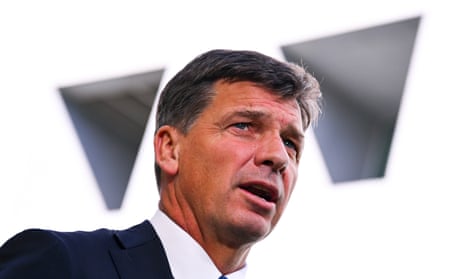
Ahhh, it is beginning to feel a lot like budget.
Expect to see more interest groups call for all sorts of things to be ruled out from here to May.

Elias Visontay
Transport Workers Union blasts call to halve truck fuel tax credits
The Transport Workers Union has blasted a proposal calling on the Albanese government to halve Australia’s fuel tax credit scheme for heavy vehicles, suggesting the idea would cause a spike in truck crash deaths.
A new report from the Grattan Institute has found that slashing by half the $8bn a year Australia gives as credits to mining trucks, semi-trailers and other heavy vehicles are crucial for budget repair and meeting emissions targets. The report found the fuel tax credit scheme was “a political gift” from which large businesses mostly benefit.
Australia’s fuel tax is 47.7 cents a litre, however vehicles that only drive off-road, including trucks on mine sites and heavy machinery, are not required to pay any fuel tax. Vehicles heavier than 4.5 tonnes such as semi-trailers, buses and B-doubles only have to pay a reduced rate, and receive a partial credit of 20.5 cents. Smaller vehicles pay the full tax, incorporated into the cost of petrol at the bowser.
On Monday morning, the TWU joined the National Farmers Federation in criticising the idea. The TWU said fuel tax credits are a “lifeline for truckies” and called the Grattan Institute’s proposal “shortsighted and dangerous”.
“The fuel tax credit scheme provides relief to operators and drivers on razor-thin margins, while wealthy retailers, manufacturers and oil companies at the top of supply chains squeeze transport contracts to bolster their bottom line,” the TWU statement said.
TWU national secretary Michael Kaine said major retailers factor the credits into the “pricing they impose on transport companies”. Kaine added:
The prospect of tampering with – let alone halving – a fuel cost lifeline for our essential trucking industry in the current climate is as dangerous as it is ludicrous. This move would unfairly target operators and drivers battling razor-thin margins, under pressure to cut corners in safety to stay afloat. It would decimate operators and supply lines with deadly consequences in what is already Australia’s most lethal industry.
EU and Australia set mid-year deadline for trade deal

Daniel Hurst
The trade minister, Don Farrell, has spoken with his European Union counterpart on the eve of the next round of negotiations for a free trade agreement between Australia and the EU.
It comes as the European Commission sets a deadline of the middle of this year to reach a deal with Australia. The European Commission’s Green Deal Industrial Plan for the Net-Zero Age – released last week, said:
The Commission will also continue to advance the EU’s network of Free Trade Agreements, while making the most of those already in place through effective implementation and enforcement. In particular, the Commission will work to conclude negotiations with Australia by summer 2023.
(Northern summer is the southern winter, so that means the middle of this year.)
The 14th round of negotiations for the free trade agreement between Australian and EU officials begin in Canberra today.
Farrell had a phone call with the European trade commissioner, Valdis Dombrovskis, last night. Farrell told Guardian Australia:
We had a good discussion, and we are both keen to see real progress during the week.
We both want to see our negotiators roll up their sleeves and do as much as possible to ensure we can finalise a comprehensive and ambitious FTA by mid-year.
It’s not the only trade-related talks happening this week. As previously reported, Farrell is due to meet virtually with China’s commerce ministers this week to try to make progress on resolving trade tensions between the two countries. All eyes will be on this meeting to see whether there is any movement, although it is far from clear that any major breakthrough is in the works at this stage.
Church service kicks off the parliamentary year – in pictures
Mike Bowers was at the ecumenical service ahead of the first parliament sitting this morning.
Every year, politicians and their families of all faiths are invited to a church in Canberra (it alternates) where the tone for the parliamentary year is supposed to be set.
It has also been the place of awkward handshakes between opposing leaders of political parties, strained smiles between members of the same party (depending on whatever power struggle is going on) and sometimes outright hostility.
It is still relatively early in the new parliament, so there wasn’t a lot of that this morning. Give it another year.
(There is a whole other argument about the separation of church and state and how much religion is already a part of our politics, but that is for another day)
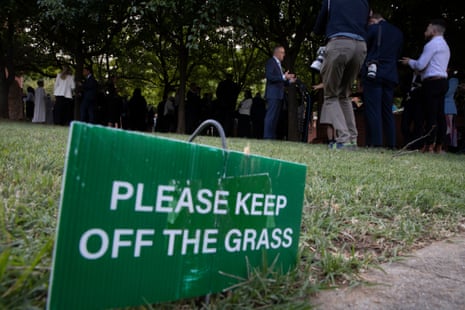

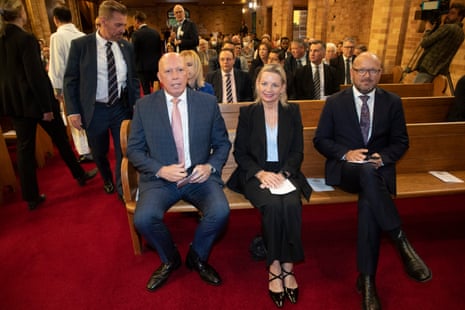
Plibersek and Joyce debate … beach cabanas
Barnaby Joyce and Tanya Plibersek, who drew the government short straw in having to ‘debate’ Joyce each week on national television, were then asked about the issue on everyone’s lips:
Beach cabanas.
Host: “There have been calls to impose a cabana ban on beaches, after a recent surge in the popularity of the structures. Tanya, would you care to throw some light or shade on this? Would you ban them?”
Plibersek:
Yeah, look, no, I wouldn’t. I think it’s fantastic that people are being sun sensible. We know that Australia’s still got some of the highest rates of skin cancer in the world. You have to be considerate; obviously you have to leave enough room for the people around you also to use the beach, you have to make sure that the life savers can see the water to keep us safe, but as long as you’re sensible about it, I say bring it on. We really need to make sure we’re protecting our own skin, and particularly the skin of our kids.
Host: Are you a cabana man, Barnaby?
Joyce:
Not many of them at Danglemah, I have to say, but anyhow, look, I’ve had melanoma twice, so I’m very, very aware of how important it is that you cover up. That’s why I wear that hat. Might look like a bit of a goose at times, but the point … is to remind people that we’re perfectly designed for the west coast of Ireland, very badly designed for the western plains of Queensland. And cabanas, to be honest, I just think, wear a shirt, wear a hat, and once you’ve had enough sun, get off the beach.
I am probably different to Tanya on this. I just think too, they just become too tight, it’s all over the beach, and it spoils it for other people. I think once you’ve had enough, get out of the sun completely, leave.
Host: OK, you’re anti‑cabanas?
Joyce:
Yeah. That will really affect my vote in New England, won’t it.
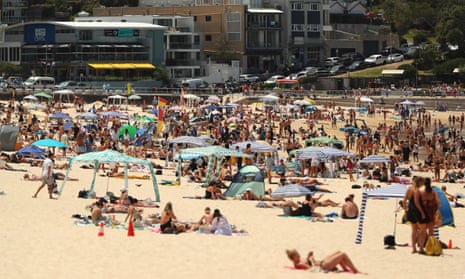
Joyce unleashes on Chinese balloon: ‘We have to become strong’
Former deputy prime minister Barnaby Joyce had very strong feelings about the Chinese spy/weather balloon and made sure to unleash them for the Seven network this morning:
Weather balloon – give me a break. Look, I’ve been saying for so long in politics, right back to 2009 when I came back as deputy prime minister, Australia has to become as strong as possible as quickly as possible, right? We worry about peripheral issues – climate change, constitutional change – but the biggest change our nation will have is if you’re dominated, not so much invaded, but dominated by the Communist party in China. That will be the biggest change in your life.
Now, the purpose of this balloon … it had two purposes. One, to see how it was detected, and the other one is to see how the American people in politics reacted. And for that, it determined the weather of that circumstance very, very well.
Now I don’t know whether Truman or Reagan or Kennedy would have waited till it got off the South Carolina coast after trouncing its way all around the United States before they decided to shoot it down, but we now live in a world where fighter planes go over Taiwan and this – note, it’s a military balloon, let’s just cut through the rhetoric – is making its way across the United States. Australia has to read the tea leaves, we have to read the tea leaves, we have to focus on the main game, we have to become strong, and if we don’t, well, we’re fools.
For the record, American security agencies reported actions had been taken to limit any spy capability of the balloon before it was shot down, and had waited for it to travel over the ocean before carrying out the mission to destroy it, to limit damage to people on the ground. It was later released that these balloons had entered the US airspace under the Trump administration and nothing was done.












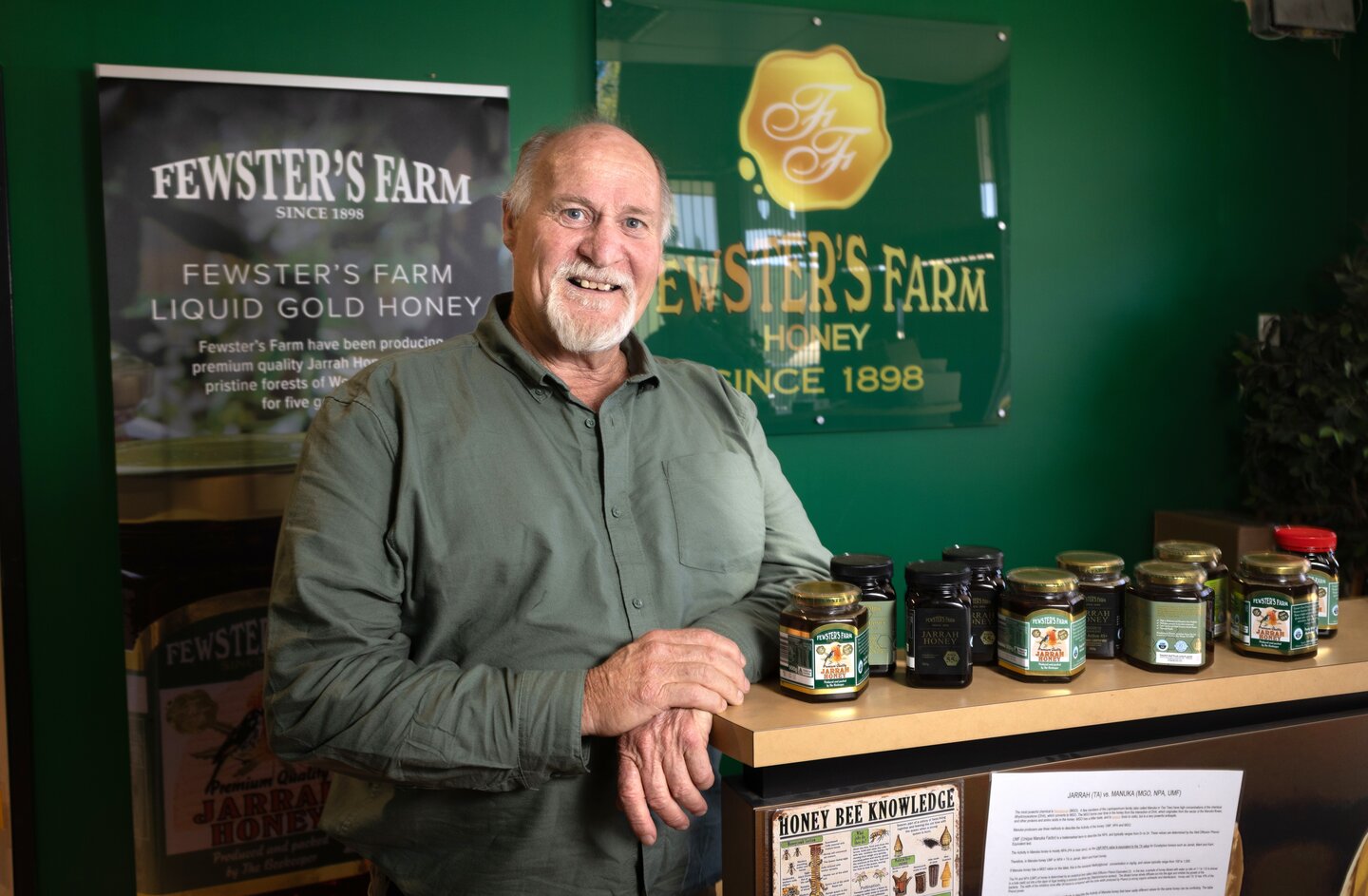
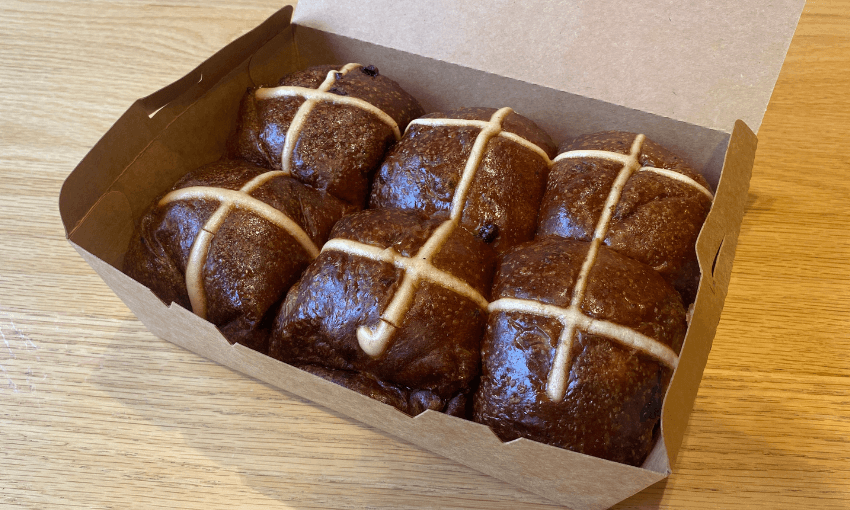




Discussion about this post